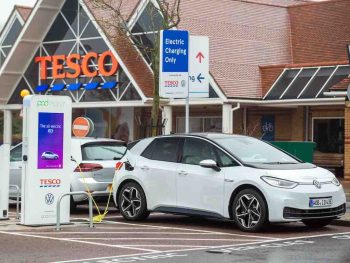Nearly 1,000 EV charge points added to supermarkets since early 2020
Just under 1,000 new EV charge points have gone live at supermarkets in the last 21 months, with Tesco and Morrisons leading the way.

Tesco has added more EV chargers than any other supermarket by installing 641 devices in the last 21 months; giving it a total of 922 across its 4,008 stores
At the same time, the total number of EV charger units on supermarket sites has risen to 2,059, up 85% from 1,112 in January 2020.
It means nearly 8% of all the UK’s 26,000 publicly accessible charge points are located at supermarkets – up from 6.5% in early 2020.
Tesco is at the forefront when it comes to the sheer number of charge points; it’s added more EV chargers than any other supermarket by installing 641 devices, giving it a total of 922 across its 4,008 stores – that’s 676 more than its nearest EV charging rival Asda which has 246 chargers. And Tesco now has charging facilities at 514 of its sites – 372 more than at the start of last year. But only 13% of its stores have EV charging capability, due to the size of its store network.
Morrisons has the greatest proportion of chargers across its network of any supermarket – it installed chargers at 112 stores over the 21 months studied by Zap-Map and the RAC, giving it a total of 201 sites with EV facilities, equivalent to 40% of its estate.
Nearest rival Lidl has chargers at a quarter (24%) of its stores after adding EV facilities at 141 locations, giving it 203 sites in total.
When it comes to rapid chargers, some 280 extra charge points were installed at supermarkets from the start of 2020 to September 2021; there are now 454 for EV driving shoppers to use in the UK.
Morrisons has more rapid chargers than any other supermarket; installed at 40% (197 locations) of its 497 stores, compared to nearest rival Lidl which has 150 rapid charging locations, representing 17% of its 860 stores. In comparison, Tesco currently lags behind Morrisons and Lidl when it comes to rapids with just 64 – and all but two of those were added since early 2020.
Melanie Shufflebotham, co-founder of Zap-Map, said it was encouraging to see the supermarkets’ progress on rolling out charge points; both Zap-Map and the RAC have both long advocated such a move due to the fact that customers spend around 45 minutes on average in their stores – an ample amount of time to top up an electric car.
“These facilities will be good both for ‘top-up’ charging and as a replacement for home charging,” outlined Shufflebotham. “As we move towards 2030, it will be important for supermarkets not only to accelerate this roll-out but also to ensure that the consumer experience is as good as possible by providing ‘open access’ and simple payment options.”
RAC director of EVs Sarah Winward-Kotecha also said supermarkets have a crucial role to play in the UK’s charging infrastructure.
“While the majority of drivers going electric will be fortunate enough to be able to charge easily on their driveways at home, for the remainder it won’t be so easy so having access to free, or affordable, charging facilities at supermarkets is very important, and could even help accelerate EV take-up in the first place.
“Rapid charge points, in particular, make it possible to run an EV easily without access to a home charger as drivers can get their cars topped up in the time it takes them to do their weekly shop. We call on all the supermarket chains to let their customers know what to expect when it comes to EV charging provision and recognise the vital role they play in encouraging many more drivers to opt for electric cars next time they change their vehicles.”












